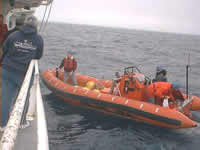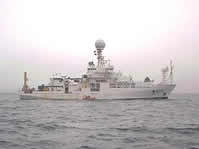| |
| |

A launch from the Ron Brown picking up supplies
for a mooring.

The Ron Brown up close and personal for a transfer of mooring supplies.
|
|
R/V Wecoma - CTD Cruise
Science News
Science
Report - Sunday, July 22, 2001
Position - 45 52.889' N /129 55.578' W
Chief Scientist Ed Baker
Perhaps
the most distinctive aspect of oceanography,
compared to most other natural sciences, is the high premium placed on
adaptability. At sea we are a laboratory isolated from shoreside
resources and obliged to perform our experiments within a strictly
predetermined amount of time (other scientists are waiting at the dock
for
their valuable time on the ship). We have been painfully reminded of
those limitations today. Late yesterday one of our two CTD winches
failed, unfortunately while the CTD package dangled at the end of the
wire, a mile beneath the safety of the ship's deck. The ship's crew has
spent a long night tirelessly tracking down the problem.
Despite their work, the winch remains unfixable. Our only solution is
to wrap the wire around a capstan on the fantail, slowly pull it onboard,
and figure-eight a mile of cable on the deck. This operation is dangerous
and exacting, since half a ton of equipment at the wire's end resists
our efforts. After retrieving the CTD, we will switch it to the ship's
other winch and wire, make the necessary mechanical and electrical connections,
and recommence the science operations.
This
unwelcome interruption has cost us nearly a full day's time. Now we must
decide how to adjust the remainder of our schedule to accommodate this
loss. It's unlikely we can work much faster than planned, as we are constrained
by the speed of the ship and wire, and the time needed to process our
water samples. We always plan our schedules conservatively, to anticipate
bad weather, equipment problems, and other slowdowns, so even with this
delay we should accomplish essentially all of our major objectives.
|
|

